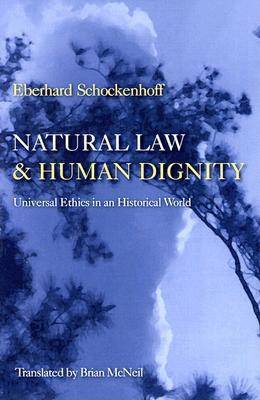
- Retrait gratuit dans votre magasin Club
- 7.000.000 titres dans notre catalogue
- Payer en toute sécurité
- Toujours un magasin près de chez vous
- Retrait gratuit dans votre magasin Club
- 7.000.0000 titres dans notre catalogue
- Payer en toute sécurité
- Toujours un magasin près de chez vous
Natural Law & Human Dignity
Universal Ethics in an Historical World
Eberhard SchockenhoffDescription
Do human rights apply only to a certain culture group or can they be demanded of all cultures and religions? This discussion about a common world ethos demonstrates how relevant and explosive that question is. In his study of ethical relativism and historical thinking, Eberhard Schockenhoff shows how the universal recognition of fundamental norms that guarantee the minimum conditions for human existence can be substantiated.
Dealing critically with the two most important branches of research in present-day moral theology--autonomous morality and teleological ethics--the author presents a new theological-ethical theory of natural law. Integrating the theory of practical reason and Aquinas' understanding of natural inclinations, Schockenhoff compares this synthesis to the insights of present-day anthropology. This method allows him to re-establish a connection to classical natural law ethics. In so doing, he indicates how ethics can fulfill its most important duty: to arrive at the recognition of anthropologically grounded material norms without falling prey to a logical error. According to Schockenhoff, claims of natural law and of human rights formulate an indispensable minimum, while biblical ethics (the decalogue and the Sermon of the Mount) and the high ethos of the world religions point the way to an encompassing realization of the concept of the good life.
Renowned moral theologian Eberhard Schockenhoff is professor at Albert-Ludwigs-Universität Freiburg. He is the author of numerous works and managing editor of Zeitschrift für Medizinische Ethik. Brian McNeil is a parish priest in Munich and a translator of theological literature.
PRAISE FOR THE BOOK:
"The book is impressive in many respects. It is thorough and precise about the specific problems associated with natural law theory, and the chapters on relativism and historicism exhibit impressive erudition and insight. Few books on natural law grapple so extensively and fairly with objectors as does this one, and its responses are admirable in their breadth and depth."- Mark Graham, Theological Studies
"A masterly treatment of many of the most important issues in moral theology."--Brian V. Johnstone, Studia Moralia
"This book demonstrates convincingly that natural law has not become obsolete in ethical discussions. . . ."--Peter Fonk, Theologische Revue
"In regard to topics that are coined by the Roman-Catholic tradition, the author includes Protestant authors in his considerations with a naturalness that has to be seen as a fortunate sign of ecumenical openness. Schockenhoff manages to revive answers of the tradition that have sometimes been put aside, and to bring them up in the challenges of today."--Heinrich Bedford-Strohm, Theologische Literaturzeitung
"An exceptional discussion of the concept of natural law as it applies to a modern world of moral relativism. . . . This is a high quality work, providing both a wide overview of the concerns of natural law and offering a respectable solution worth further consideration. Schockenhoff's work is highly recommended."--Matthew Ryan McWhorter, Catholic Books Review OnLine
"This book by one of the leading Catholic moral theologians in Germany, teaching at Freiburg University, presents a simple thesis in an elaborate and sophisticated fashion....Schockenhoff's highly learned and impressive account deserves attention and critical engagement." -- Bernd Wannenwetsch, Studies in Christian Ethics
Spécifications
Parties prenantes
- Auteur(s) :
- Traducteur(s):
- Editeur:
Contenu
- Nombre de pages :
- 346
- Langue:
- Anglais
Caractéristiques
- EAN:
- 9780813213408
- Date de parution :
- 01-10-03
- Format:
- Livre broché
- Format numérique:
- Trade paperback (VS)
- Dimensions :
- 150 mm x 235 mm
- Poids :
- 539 g

Les avis
Nous publions uniquement les avis qui respectent les conditions requises. Consultez nos conditions pour les avis.






